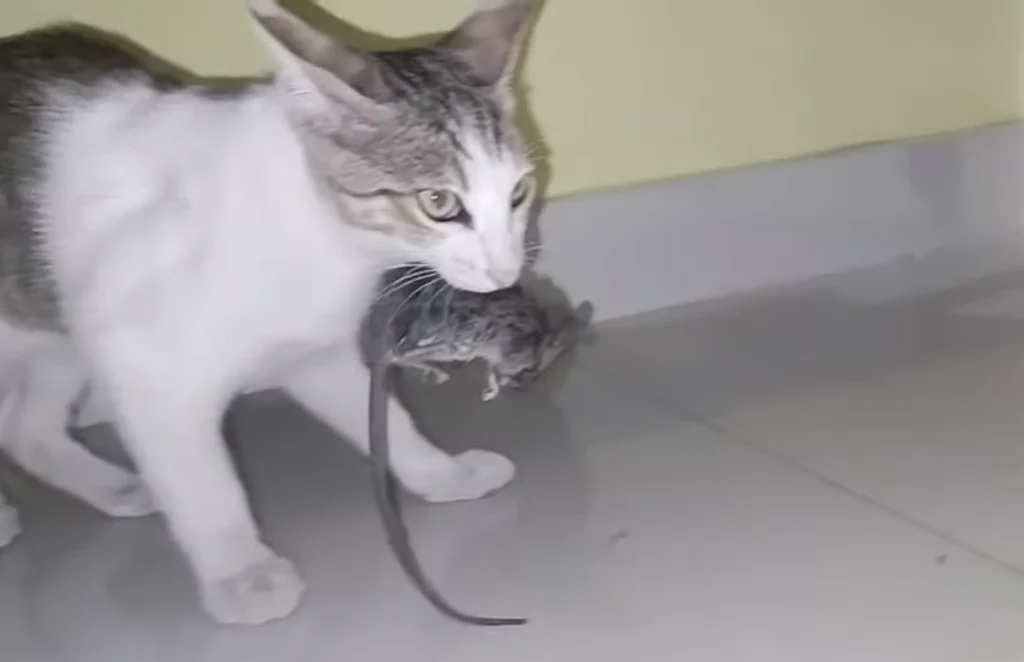Do Cats Eat Mice? Understanding the Natural Diet of Felines
By: Lana Koh

The information in this article is intended to educate cat parents and is not a substitute for veterinary guidance. In case of any concerns about your cat’s health, please talk with your veterinarian.
Many cat owners wonder if their pets will eat mice. Cats are natural hunters, and hunting small animals like mice is instinctive behavior. The answer is yes; cats do eat mice as part of their natural diet. This behavior is not only common but also showcases their skills as predators.
While it may seem alarming for some owners, eating mice has been a part of a cat’s life for thousands of years. Mice provide protein and other nutrients that can support a cat’s health. However, there are risks involved, such as the potential for disease transmission if the mouse has been exposed to toxins or parasites.
Understanding this aspect of cat behavior can help pet owners make informed decisions about their pets’ diets and safety. By exploring the details of why cats eat mice and any precautions to take, owners can better appreciate their furry companions’ instincts.
Also Read: Can Cats Eat Plantains?
Understanding Feline Predatory Behavior
Feline predatory behavior is rooted in natural instincts, influencing how cats hunt. This behavior varies significantly between indoor and outdoor cats, impacting their interactions with small animals and birds.
Natural Instincts and Prey Drive
Cats are natural hunters with strong prey drives. This instinct is inherited from their wild ancestors. Even well-fed indoor cats may hunt small animals and birds out of instinct rather than hunger.
Their hunting pattern often includes stalking and pouncing. Cats approach their targets quietly, demonstrating patience and agility. This behavior mimics how wild cats hunt for food in their natural habitats.
Factors like age, experience, and environment can also affect a cat’s hunting skills. Kittens learn from their mothers, developing these skills over time. Even without direct experience, many cats retain a strong instinct to chase and catch.
Indoor vs. Outdoor Cat Hunting Habits
Indoor cats may not have as many opportunities to hunt as outdoor cats. However, they often engage in play that simulates hunting. Toys that mimic the movement of small animals help satisfy their instincts.
Outdoor cats, on the other hand, have more chances to encounter real prey. They may hunt mice, birds, or lizards as part of their daily activities. Studies show that outdoor cats are more skilled at catching these animals due to practical experience.
Both indoor and outdoor cats may bring their catches back home, as a way to share their success with their owners. This behavior highlights their instinctual need to hunt and their bond with their human companions.
Also Read: Can Cats Eat Tuna?
Health and Safety Concerns
When cats eat mice, there are specific health and safety risks to keep in mind. These include potential infections from parasites and exposure to harmful substances. Understanding these risks is vital for any cat owner.
Risks of Toxoplasmosis from Mice
Toxoplasmosis is a disease caused by the parasite Toxoplasma gondii. Cats can contract this parasite by eating infected mice. Symptoms can range from mild to severe.
Common symptoms include:
- Fever
- Loss of appetite
- Lethargy
Pregnant women should be especially cautious, as this infection can pose risks to unborn babies. If a cat shows signs of illness after eating a mouse, consulting a vet is essential for proper diagnosis and treatment.
Rodent Poison and Secondary Poisoning
Poisoning is another serious concern. If a mouse has been exposed to rodent poison, a cat that eats it can suffer from secondary poisoning.
Signs of poisoning include:
The type of rodent poison used can determine the severity of symptoms. Prompt veterinary attention is crucial if a cat is suspected of ingesting a poisoned mouse. This ensures appropriate care and reduces serious health risks.
Read: Can Cats Eat Tofu?
Nutritional Aspects of Cats Eating Mice
Eating mice provides cats with a natural source of nutrition. Mice offer protein, fats, and essential nutrients that can benefit a cat’s health. Understanding how the nutritional value of mice compares to commercial foods is important for pet owners.
Comparing Mice to Commercial Cat Food
Mice contain high-quality protein that supports muscle growth and energy. The protein found in whole prey is often more digestible than that in many commercial cat foods. Additionally, mice provide natural fats that contribute to healthy skin and fur.
In contrast, commercial cat food may vary in quality. Some brands use fillers and low-quality ingredients. While wet food options can be beneficial for hydration, they might not always replicate the complete nutrition found in whole prey.
Here’s a quick comparison:
| Nutritional Aspect | Mice | Commercial Cat Food |
| Protein | High | Variable |
| Fat | Natural | Might Include Fillers |
| Moisture | Natural | Varies by type |
Read: How To Avoid Cat Food Storage Mistakes?
Special Dietary Considerations for Female Cats
Female cats may have unique dietary needs, especially during pregnancy or lactation. In these times, the additional nutritional requirements for growth and milk production become significant. Mice, with their balanced nutrients, can help support these needs.
Also, female cats often require more calcium and protein when nursing. Mice can naturally provide these nutrients without the additives found in some commercial foods. Feeding them mice as an occasional treat can enhance their overall health, provided it is done safely.
Pet owners should monitor how often they offer mice, ensuring it fits within a balanced diet. Regular vet check-ups are essential, especially for pregnant or nursing females.
Click To Read: Can Cats Eat Tortillas?
Frequently Asked Questions
Many cat owners wonder about the behavior of their cats when it comes to catching and eating mice. The following questions explore what happens after a cat catches a mouse, their eating habits, and how common this behavior is.
Final Thoughts
Cats are natural-born hunters, and their instinct to catch and eat mice is deeply ingrained in their behavior. While domestic cats may not rely on mice for survival, this predatory activity remains a vital part of their identity. Understanding this behavior helps owners appreciate their pets’ instincts while ensuring their safety and health.
However, eating mice can pose risks, such as exposure to parasites or toxins. By balancing their natural hunting tendencies with a nutritious commercial diet, cat owners can support their feline’s well-being. This approach honors their wild heritage while keeping them safe in a domestic environment.

About the Author
Lana Koh
Lana is a passionate cat lover with years of experience caring for her feline companions. As a dedicated volunteer at animal shelters, she’s gained valuable insights into the world of cats. Lana channels her love and knowledge into writing informative and engaging articles for fellow pet owners, covering topics like cat health, nutrition, grooming, behavior, and the special bond we share with our feline friends.
